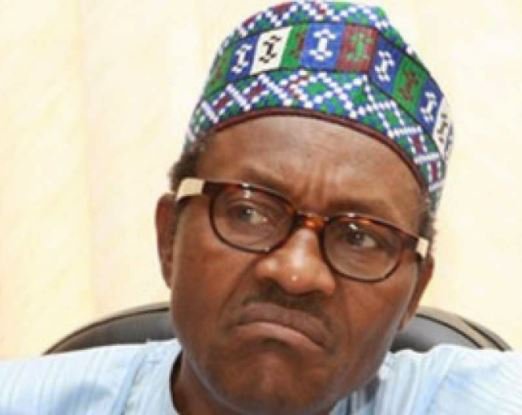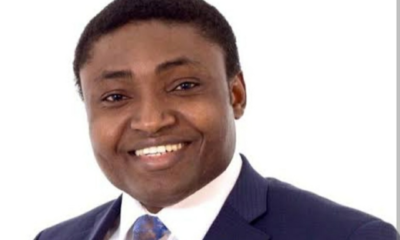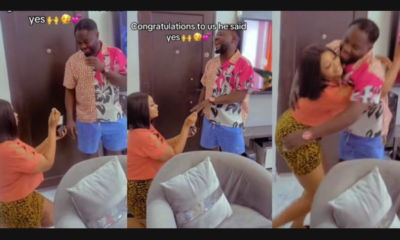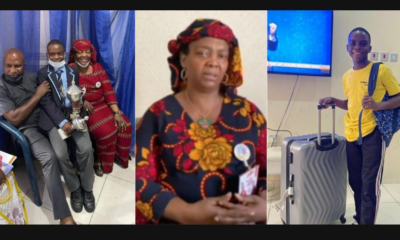News
Buhari Was Right On Ganduje But…
However, the President does not usually adhere to those points in most cases, especially when people from outside his political party are accused of corruption.
When President Muhammadu Buhari visited Kano State for campaign last week, he raised the hand of Governor Abdullahi Ganduje, to show his support for the governor’s second term bid on the platform of the ruling All Progressives Congress.

That action drew condemnation from different quarters because it was seen as an open sign of endorsement of Ganduje despite the allegations of bribery against him, following the release of a series of video clips by the publisher of an online news website, Daily Nigerian, Mr Jafar Jafar.
In response to the criticism against Buhari as well as the allegation that he treats issues of corruption differently depending on who is involved, a statement was released by the Presidency through the Senior Special Assistant on Media and Publicity, Mr Garba Shehu, in Abuja on Thursday. The statement noted that as a sitting governor, Ganduje enjoys immunity from prosecution.
The statement added: “Furthermore, under Nigerian laws, a suspect is presumed innocent until proved guilty in a court of law.
“In the circumstances, the matter is in court and the President has no power to dictate to the court or the Kano State House of Assembly, which is already investigating the matter, about what to do with the allegations against Ganduje.”
The statement from the President’s office was right on all fronts. However, the President does not usually adhere to those points in most cases, especially when people from outside his political party are accused of corruption.
That played out in his recent comment about the Chief Justice of Nigeria, Justice Walter Onnoghen. Buhari had said inter alia: “It is no secret that this government is dissatisfied with the alarming rate in which the Supreme Court of Nigeria, under the oversight of Justice Walter Onnoghen, has serially set free persons accused of the most dire acts of corruption, often on mere technicalities, and after quite a number of them have been convicted by the trial and appellate courts.”
Interestingly, Buhari made the comment about Onnoghen a few days before he made his comment about Ganduje. When Buhari visited France in November 2018, he spoke with the Nigerian community there. The issue of Ganduje’s alleged collection of bribes was raised. But in his reaction, Buhari commended Ganduje for being very responsible by continuing and completing the projects started by his predecessor, Alhaji Rabiu Kwankwaso. He commended Ganduje for his performance, noting that Ganduje did not divert the money meant for infrastructure.
In January when he and his deputy, Yemi Osinbajo, were guests on the TV show, The Candidates, hosted by Ms Kadaria Ahmed, Buhari was again asked about Ganduje and the bribery allegations against him. He declined to comment on it, noting that the matter was in court. But he doubted the authenticity of the video clips and promised to be better briefed on the matter upon his campaign visit to Kano.
However, many months before the expiration of the tenure of Ayo Fayose as governor of Ekiti State, the Economic and Financial Crimes Commission had started warming up to arrest him and even posting comments about that in the social media. Fayose was probed even while in office. His personal bank accounts were frozen and his property temporally forfeited. Likewise, since Governor Samuel Ortom of Benue State defected to the Peoples Democratic Party, he has been probed by the EFCC in spite of the immunity he enjoys as an incumbent governor. Similarly, as an incumbent governor, Mr Udom Emmanuel of Akwa Ibom, has been under investigation by the EFCC.
Furthermore, all the pronouncements made by the law courts directing that Sheikh Ibrahim El-Zakzaky, leader of the Islamic Movement of Nigeria, and his wife be released from detention have been disobeyed by the administration of Buhari. There have also been other court judgements that were not obeyed in recent years by this administration.
The point of divergence between Buhari and most of his critics is the double standard he applies on the issue of corruption against those in his good books and those in his bad books. Most Nigerians would want the issue of corruption tackled decisively and dispassionately, no matter who is involved. In fact, if Buhari’s cronies and even family members were made to face the law for any infraction, the public would give the President more support as a fair and honest leader.
Importantly, in fighting corruption, the issue of following the law must be adhered to fully, no matter how frustrating that may be. Lawyers are bound to exploit technicalities in favour of their clients. But that is their duty. It is not their duty to make things easy for the prosecuting lawyers and the accused.
However, an accused person is deemed innocent until proved guilty by a court of law, no matter how convinced the people are about the complicity of the accused in the crime in question. It does not matter how high or low the person is in society. For example, the man widely known as “Evans the kidnapper” is not a kidnapper in the eyes of the law, in spite of all the “confessions” he made which were recorded in video and circulated online and via TV stations.
He has even alleged that he was forced to make those confessions by the police, thereby nullifying all those detailed stories he told about himself and activities shortly after he was arrested in 2017. In the eyes of the law, he is an alleged kidnapper. It is only when the court has found him guilty that he can be recognised legally as a kidnapper. If the prosecuting lawyers fail to prove their case in court, the court can strike out the case and set him free. That will make him free from all accusations of kidnapping.
That scenario played out in the case of the murder of Alhaja Kudirat Abiola, a wife of Chief MKO Abiola, the presidential candidate of the Social Democratic Party in the June 12, 1993 election in Nigeria. Even though Sergeant Barnabas Jabila Mshiela, a.k.a. “Sergeant Rogers,” testified in court, giving a detailed account of how Major Hamza al-Mustapha, the former Chief Security Officer of late Nigerian military head of state, Gen Sani Abacha, directed him to kill Kudirat, al-Mustapha is not today recorded in law as the killer.
The reason is that even after he was convicted and sentenced to death by hanging by a Lagos High Court, he was eventually discharged and acquitted of the crime by the Appeal Court, Lagos Division on Friday, July 12, 2013. That judgement was not appealed and al-Mustapha has remained a free man with no record as an ex-convict. The same thing happened in the case of Chief Olabode George whose sentence was quashed by the Supreme Court in 2013, even after spending two years. People can murmur about them, but they are free of all accusations against them and are not hindered from holding any post in the nation.
That is how the law operates. It usually does not feel good to many people to watch people they are “very certain” of being guilty of one crime or the other set free by the court, but that is how the law is structured to run. Similarly, it is easy for many people to brand accused people “criminals” even when they have not been found guilty. It is only when we are in the shoes of those who are so branded that we understand how grossly unfair it is to do so and also how dangerous it is to breach the rule of law in an attempt to find someone guilty of an accusation.
– Twitter @BrandAzuka for the Punch
Follow us on social media:-

 Celebrity Gossip & Gist1 day ago
Celebrity Gossip & Gist1 day agoEgungun wife finally reacts to her husband trending leaked video (Watch)
-

 News1 day ago
News1 day agoFinnish official explains why Simon Ekpa cannot be granted bail
-

 Love & Relationship10 hours ago
Love & Relationship10 hours ago”He said yes” – Lady goes down on one knee to propose to her man, celebrates as he accepts
-

 News1 day ago
News1 day agoTears as mother of late Dowen student who died from bullying passes away after prolonged illness







